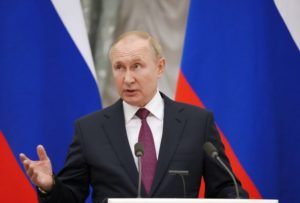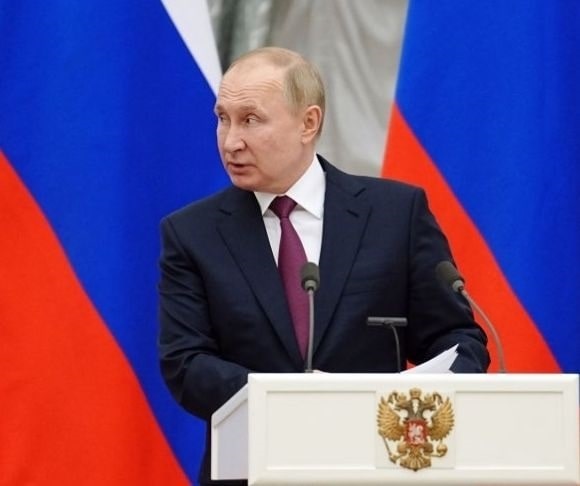While Moscow threatens to invade Ukraine, Russian leaders might want to gaze eastward to a potential invasion of their own country. They won’t have far to look, thanks to Beijing’s nearly maniacal appetite for expansion. For some time, China-watchers have reported an invasion of Russia’s far eastern region by Chinese farmers. And as recently as two years ago, the People’s Republic of China (PRC) made the point that the seaport of Vladivostok belonged to Beijing.

Vladimir Putin (Photo by Kay Nietfeld/picture alliance via Getty Images)
The prospect of Russia’s president Putin amassing troops on the Ukraine border and threatening the West while Chinese squatters are quietly but surely sent into the Russian Far East (RFE) is curious. The on-again, off-again migration of farmers and small businesses across the Russian border has been a geopolitical topic since the late 1990s. The issue, however, has been just below the radar for most pundits, who believe the design the Chinese Communist Party (CCP) has on the RFE is no longer high on the CCP’s list of to-dos. That line of thinking may be premature.
Some estimates suggest between 300,000 and 500,000 Chinese farmers have crossed the border, but more conservative numbers were in the 29,000 range in 2010. The influence of China’s looming presence on the Russian Bear’s frontier from a geopolitical perspective has not gone entirely unnoticed. There is some concern for two reasons. “First, Russians view it in the context of the enormous and growing economic and population incongruence with China and second, the three-decades-long Sino-Soviet confrontation, including border clashes in the late 1960s,” explains Ivan Tselichtchev in a South China Morning Post article. Yet the PRC is in the land-gobbling game for the long haul. Additionally, over time there has been a festering resentment in the Chinese government that goes back centuries. “From the Treaty of Nerchinsk (1689) to the Convention of Peking (also known as the Treaty of Beijing), the border between the two countries had been adjusted in Russia’s favor by what China has referred to as ‘unequal treaties,’” as John Herbst, former U.S. ambassador to Ukraine, wrote in his 2020.
As an aside, though still relevant, there is a notion Russia lost control of former Soviet bloc nations when the Soviet Union dissolved because NATO and, principally, the U.S. took advantage of the Kremlin’s state of disarray with “unequal treaties.” Putin routinely makes this point in talking about the December 5, 1994, Budapest Memorandum supporting Ukraine’s independence and sovereignty. So, it’s true: “What goes around, comes around.”
 What should be troubling for Putin are recent reports of Beijing’s not-so-subtle claims that Vladivostok might belong to the PRC. “…China’s claims over Russia’s Vladivostok are not limited to state-owned media. Even Chinese diplomats have jumped in,” reports Akshay Narang in The Frustrated Indian Post (TIFIPOST), a conservative Indian blog gaining readership in East Asia. But such accounts raise the question of whether China can be serious about its claims. It seems so. When convenient, the CCP invokes historical precedent to substantiate what it sees as legitimate. “’The history of Vladivostok (literally Ruler of the East) is from 1860 when Russia built a military harbor.’ But the City was Haishenwai as Chinese land before Russia annexed it via unequal Treaty of Beijing,” declared Shen Shiwei in a state-affiliated media tweet. Keep in mind Vladivostok is the home and primary operating base of Moscow’s Pacific Fleet, including nuclear surface ships and submarines. Vladivostok is also Russia’s operating portal to the Arctic. Nonetheless, Beijing’s hubris knows no bounds, and Moscow’s essential portal to the Pacific could be in the CCP’s sights.
What should be troubling for Putin are recent reports of Beijing’s not-so-subtle claims that Vladivostok might belong to the PRC. “…China’s claims over Russia’s Vladivostok are not limited to state-owned media. Even Chinese diplomats have jumped in,” reports Akshay Narang in The Frustrated Indian Post (TIFIPOST), a conservative Indian blog gaining readership in East Asia. But such accounts raise the question of whether China can be serious about its claims. It seems so. When convenient, the CCP invokes historical precedent to substantiate what it sees as legitimate. “’The history of Vladivostok (literally Ruler of the East) is from 1860 when Russia built a military harbor.’ But the City was Haishenwai as Chinese land before Russia annexed it via unequal Treaty of Beijing,” declared Shen Shiwei in a state-affiliated media tweet. Keep in mind Vladivostok is the home and primary operating base of Moscow’s Pacific Fleet, including nuclear surface ships and submarines. Vladivostok is also Russia’s operating portal to the Arctic. Nonetheless, Beijing’s hubris knows no bounds, and Moscow’s essential portal to the Pacific could be in the CCP’s sights.
The China-Russia border influx of Chinese and Beijing’s claims on Russian territories may just be a little wrinkle in an otherwise beautiful friendship. Or there could be a real problem for Putin lurking just under the smile and friendly handshake of President Xi. Referring again to Herbst’s words, “This is all low key, but China meticulously advances its claims with references to history and, also, with little fanfare at first. The Chinese invented the long game.” For President Xi, it’s just a matter of time.
The views expressed are those of the author and not of any other affiliation.
~ Read more from Dave Patterson.




